-
 Bitcoin
Bitcoin $91,256.3033
3.39% -
 Ethereum
Ethereum $1,723.5244
5.98% -
 Tether USDt
Tether USDt $1.0006
0.10% -
 XRP
XRP $2.1808
2.69% -
 BNB
BNB $611.6352
1.26% -
 Solana
Solana $145.2440
4.71% -
 USDC
USDC $1.0001
0.07% -
 Dogecoin
Dogecoin $0.1726
6.92% -
 TRON
TRON $0.2472
1.71% -
 Cardano
Cardano $0.6638
3.44% -
 Chainlink
Chainlink $14.0337
4.16% -
 Avalanche
Avalanche $21.8740
6.44% -
 UNUS SED LEO
UNUS SED LEO $8.9676
-1.35% -
 Stellar
Stellar $0.2598
-0.15% -
 Sui
Sui $2.4368
8.47% -
 Shiba Inu
Shiba Inu $0.0...01309
4.18% -
 Hedera
Hedera $0.1782
3.94% -
 Toncoin
Toncoin $2.9908
-0.39% -
 Bitcoin Cash
Bitcoin Cash $361.0314
4.64% -
 Hyperliquid
Hyperliquid $18.8127
3.63% -
 Litecoin
Litecoin $82.7354
3.19% -
 Polkadot
Polkadot $3.9250
0.37% -
 Dai
Dai $1.0001
0.03% -
 Bitget Token
Bitget Token $4.5168
0.88% -
 Ethena USDe
Ethena USDe $0.9994
0.01% -
 Pi
Pi $0.6419
0.67% -
 Monero
Monero $219.7573
2.35% -
 Pepe
Pepe $0.0...08517
7.03% -
 Uniswap
Uniswap $5.6768
4.46% -
 Aptos
Aptos $5.1717
0.94%
What are the risks of an Ethereum ETF?
When investing in an Ethereum ETF, it's crucial to assess the ETF issuer's credibility, track record, and compliance with regulations to ensure investor confidence and mitigate potential risks.
Feb 15, 2025 at 05:12 pm
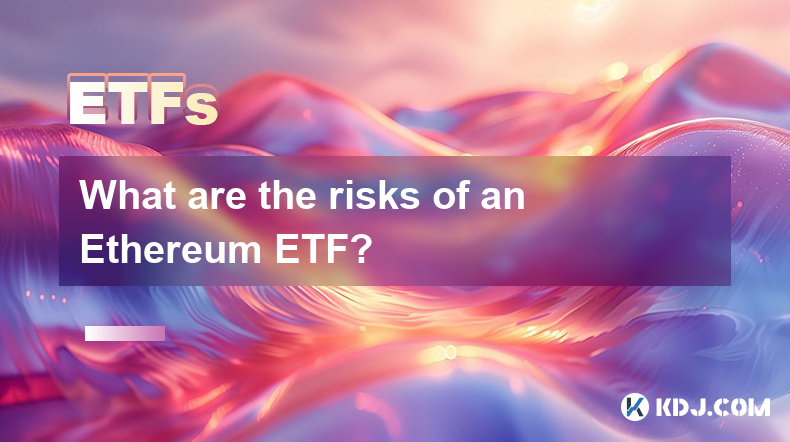
Key Points:
- Evaluating the underlying assets and their regulatory status
- Assessing the credibility and track record of the ETF issuer
- Understanding the potential for tracking error and liquidity issues
- Monitoring market volatility and price fluctuations
- Considering the impact of regulatory changes and legal uncertainties
Risks to Consider Before Investing in an Ethereum ETF
1. Uncertainty of Underlying Assets
The Securities and Exchange Commission (SEC) has yet to approve a spot Ethereum ETF. Instead, Ethereum ETFs currently available invest in Ethereum futures contracts, which are derivatives tracking the future price of Ether. This introduces an additional layer of risk, as the value of an Ethereum ETF is tied to the price of futures contracts, not the underlying asset itself.
2. Regulatory Risks
The regulatory landscape surrounding cryptocurrencies is constantly evolving. Changes in regulations could significantly impact Ethereum ETFs, including their availability, trading rules, and tax implications. Investors should stay informed about regulatory updates that may affect their investments.
3. Credibility and Track Record of Issuer
The credibility of the ETF issuer is crucial. Investors should research the issuer's experience in managing ETFs, their financial strength, and their track record of compliance with regulations. Reputable issuers with a proven track record can increase investor confidence.
4. Tracking Error and Liquidity
Tracking error measures the difference between the ETF's returns and the performance of the underlying index or asset. Liquidity refers to the ease with which an ETF can be bought or sold. Ethereum ETFs may experience tracking errors due to the volatility of Ether and potential liquidity issues in the futures market, leading to deviations from the expected returns.
5. Market Volatility and Price Fluctuations
Ether is a highly volatile asset, and its price can fluctuate dramatically. Ethereum ETFs reflect this volatility, making them susceptible to sudden price swings. Investors should be prepared for significant fluctuations in the value of their ETF, potentially leading to losses.
6. Legal Uncertainties
The legal status of cryptocurrencies remains uncertain in many jurisdictions. Changes in legal interpretations or regulations could negatively impact Ethereum ETFs, affecting their availability, trading rules, and tax treatment. Investors should stay up-to-date on legal developments related to cryptocurrencies.
FAQs:
Q: What is the expected return of an Ethereum ETF?
A: The expected return of an Ethereum ETF will vary depending on the underlying assets, the ETF's fees, and market conditions. Investors should consult the ETF's prospectus and conduct their own research to understand the potential risks and returns.
Q: Are Ethereum ETFs a good investment?
A: Whether an Ethereum ETF is a suitable investment depends on an individual's risk tolerance, investment objectives, and time horizon. Investors should carefully consider the risks outlined above before making an investment decision.
Q: What is the difference between a spot Ethereum ETF and an Ethereum futures ETF?
A: A spot Ethereum ETF would invest directly in Ethereum and provide exposure to the underlying asset's price movements. Currently available Ethereum ETFs invest in Ethereum futures contracts, which are derivatives tracking the future price of Ether, introducing additional risk factors.
Disclaimer:info@kdj.com
The information provided is not trading advice. kdj.com does not assume any responsibility for any investments made based on the information provided in this article. Cryptocurrencies are highly volatile and it is highly recommended that you invest with caution after thorough research!
If you believe that the content used on this website infringes your copyright, please contact us immediately (info@kdj.com) and we will delete it promptly.
- Dogecoin (DOGE) Consolidates Within a Symmetrical Triangle, Breakout or Decline on the Cards
- 2025-04-23 00:00:53
- BitGo Integrates sBTC, Expanding Institutional Participation in Decentralized Finance
- 2025-04-23 00:00:53
- Fartcoin (FARTCOIN) Price Prediction 2025-2030: Will FARTCOIN Price Hit $5 Soon?
- 2025-04-22 23:55:12
- Integral Ad Science Holding Corp (NASDAQ: IAS) closed at $6.38, down -2.15%
- 2025-04-22 23:55:12
- Dogecoin Faces Pressure as Elon Musk's Federal Role Nears an End
- 2025-04-22 23:50:12
- MANA Token Price Breaks Long-Term Resistance, Surging 18%
- 2025-04-22 23:50:12
Related knowledge
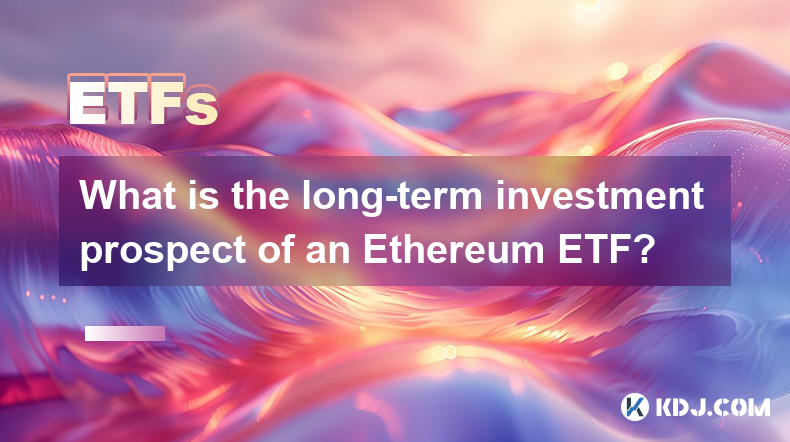
What is the long-term investment prospect of an Ethereum ETF?
Mar 18,2025 at 03:01pm
Key Points:Uncertainty surrounds the long-term prospects of an Ethereum ETF due to regulatory hurdles and market volatility.Approval hinges on regulatory clarity regarding cryptocurrencies, especially concerning investor protection and market manipulation.Successful ETF launches could boost Ethereum's price and adoption, but failure could negatively imp...
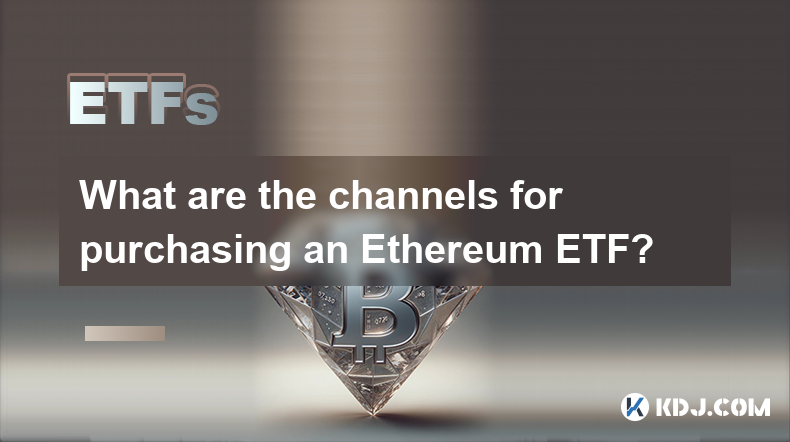
What are the channels for purchasing an Ethereum ETF?
Mar 18,2025 at 01:49am
Key Points:Currently, there are no Ethereum ETFs available for direct purchase by the general public in most major markets.Access to Ethereum exposure through ETFs is limited, mainly through futures-based ETFs.Purchasing Ethereum directly or through other investment vehicles remains a viable alternative.Regulatory hurdles and market complexities signifi...
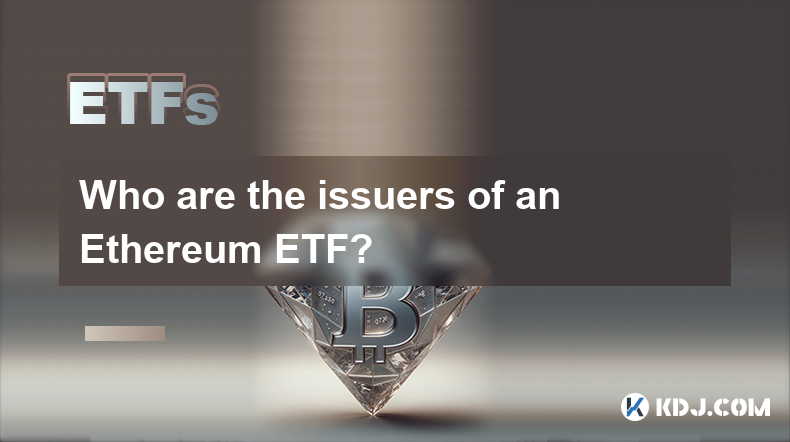
Who are the issuers of an Ethereum ETF?
Mar 19,2025 at 08:07pm
Key Points:There are no currently approved Ethereum ETFs in the US, meaning no single issuer can be definitively named. However, several firms have filed applications.The issuers of potential Ethereum ETFs will be large, established financial institutions, typically asset management companies.The specific requirements for ETF issuers are stringent and o...
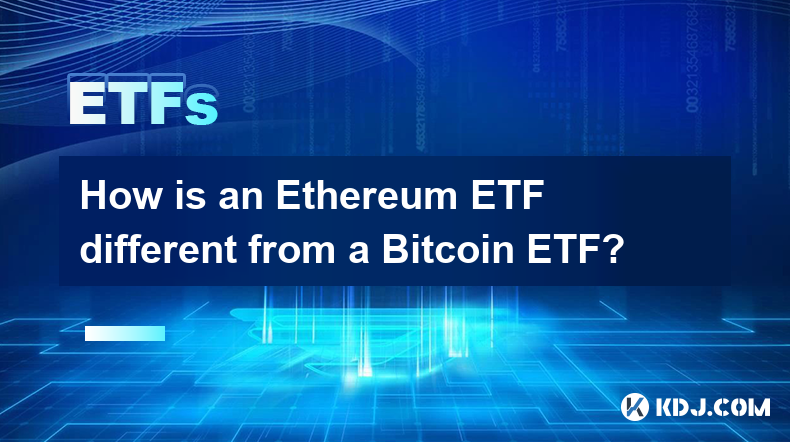
How is an Ethereum ETF different from a Bitcoin ETF?
Mar 17,2025 at 10:55am
Key Points:Underlying Asset: The core difference lies in the underlying asset: an Ethereum ETF tracks the price of Ether (ETH), while a Bitcoin ETF tracks the price of Bitcoin (BTC).Technology and Use Cases: Ethereum's blockchain supports smart contracts and decentralized applications (dApps), creating a distinct technological and investment narrative c...
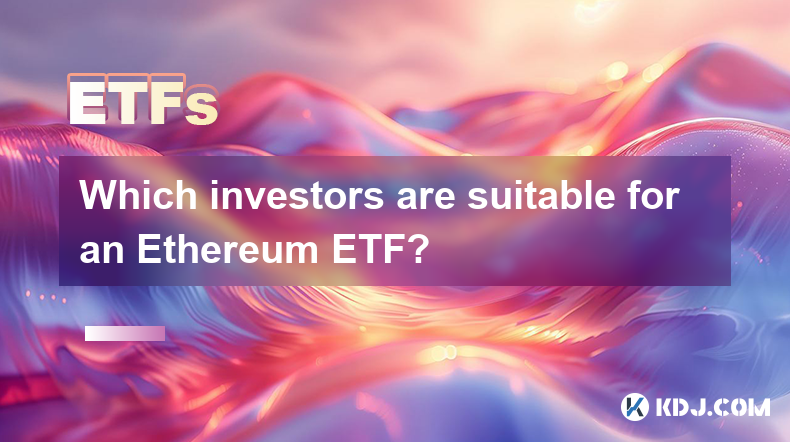
Which investors are suitable for an Ethereum ETF?
Mar 16,2025 at 05:50pm
Key Points:Risk Tolerance: Ethereum ETF investment requires a high risk tolerance due to the volatility of the cryptocurrency market.Investment Goals: Investors seeking long-term growth potential and exposure to the Ethereum ecosystem are suitable candidates.Investment Horizon: A longer-term investment horizon is crucial to weather market fluctuations.U...
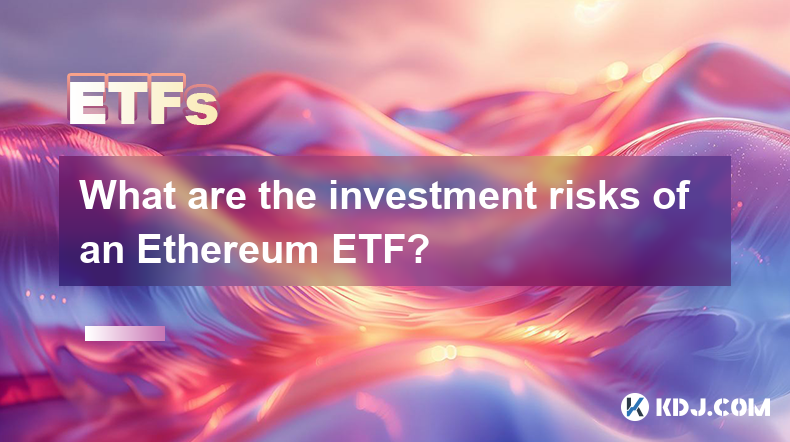
What are the investment risks of an Ethereum ETF?
Mar 18,2025 at 02:12am
Key Points:Price Volatility: Ethereum's price is highly volatile, impacting ETF share prices.Regulatory Uncertainty: Changes in regulatory landscapes can significantly affect ETF trading and performance.Market Manipulation: The potential for market manipulation, particularly in smaller ETFs, exists.Underlying Asset Risk: Risks associated with the Ethere...

What is the long-term investment prospect of an Ethereum ETF?
Mar 18,2025 at 03:01pm
Key Points:Uncertainty surrounds the long-term prospects of an Ethereum ETF due to regulatory hurdles and market volatility.Approval hinges on regulatory clarity regarding cryptocurrencies, especially concerning investor protection and market manipulation.Successful ETF launches could boost Ethereum's price and adoption, but failure could negatively imp...

What are the channels for purchasing an Ethereum ETF?
Mar 18,2025 at 01:49am
Key Points:Currently, there are no Ethereum ETFs available for direct purchase by the general public in most major markets.Access to Ethereum exposure through ETFs is limited, mainly through futures-based ETFs.Purchasing Ethereum directly or through other investment vehicles remains a viable alternative.Regulatory hurdles and market complexities signifi...

Who are the issuers of an Ethereum ETF?
Mar 19,2025 at 08:07pm
Key Points:There are no currently approved Ethereum ETFs in the US, meaning no single issuer can be definitively named. However, several firms have filed applications.The issuers of potential Ethereum ETFs will be large, established financial institutions, typically asset management companies.The specific requirements for ETF issuers are stringent and o...

How is an Ethereum ETF different from a Bitcoin ETF?
Mar 17,2025 at 10:55am
Key Points:Underlying Asset: The core difference lies in the underlying asset: an Ethereum ETF tracks the price of Ether (ETH), while a Bitcoin ETF tracks the price of Bitcoin (BTC).Technology and Use Cases: Ethereum's blockchain supports smart contracts and decentralized applications (dApps), creating a distinct technological and investment narrative c...

Which investors are suitable for an Ethereum ETF?
Mar 16,2025 at 05:50pm
Key Points:Risk Tolerance: Ethereum ETF investment requires a high risk tolerance due to the volatility of the cryptocurrency market.Investment Goals: Investors seeking long-term growth potential and exposure to the Ethereum ecosystem are suitable candidates.Investment Horizon: A longer-term investment horizon is crucial to weather market fluctuations.U...

What are the investment risks of an Ethereum ETF?
Mar 18,2025 at 02:12am
Key Points:Price Volatility: Ethereum's price is highly volatile, impacting ETF share prices.Regulatory Uncertainty: Changes in regulatory landscapes can significantly affect ETF trading and performance.Market Manipulation: The potential for market manipulation, particularly in smaller ETFs, exists.Underlying Asset Risk: Risks associated with the Ethere...
See all articles























































































